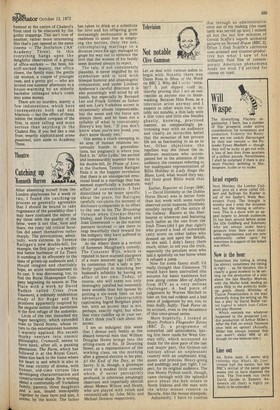Theatre
Catching up
*Kenneth Hurren After absenting myself from the London playhouses for a week or two, I found the catching-up process so generally agreeable that I should be bound to take Cognisance of the possibility that I May have confused the extent of my thirst with the quality of the brew, were it not that, here and there, the rusty old critical faculties did assert themselves rather sharply. The provocations, admittedly, were extreme. In Terence Rattigan's new double-bill, for example, the first play — a tawdry and feeble burlesque of La Tosca is numbing in its effrontery to the taste of grown-up audiences and, I Should imagine and charitably hope, an acute embarrassment to its cast. It was distressing, too, to find the Royal Shakespeare Company beginning its season at The Place with a work by David Rudkin called Cries from Casement, a tediously tendentious study of Sir Roger and his Problems apparently inspired by the singular notion that patriotism is the first refuge of the sodomite. Little of the rest disturbed my eager benignity, which extended even to David Storey, whose return to the entertainment business I warmly applaud. His recent murky venture into cosmic Philosophy, Cromwell, seems to have been, after all, a passing aberration; The Farm, which has followed it at the Royal Court, takes him back to the home where his heart is and which is also in the near vicinity of drama, with honest, -old-time virtues like developing characterisation and constructional shape. He is writing about a comfortably-off Yorkshire family, parents, three daughters and a son, bound inescapably together by their farm and also, it seems, by the bottle. The father
has taken to drink as a substitute for love and his offspring grow increasingly enthusiastic in their readiness to assist him in emptying the bottles. Only the son, contemplating marriage to a divorcee twice his age, manages to grope his way out to embrace the love that the women of his family seem doomed always to reject.
The tale, if not consistently plausible, is never engulfed by its symbolism and is told with brusque humour and unapologetic compassion; and under Lindsay Anderson's careful direction it is also punishingly well acted by all hands, but especially by Bernard Lee and Frank Grimes as father and son. Lee's Yorkshire accent is occasionally almost impenetrable, but the sense and the force are always there, and he loses not a syllable of what is conceivably Storey's key line, "If you don't know when you're not loved, you don't know bloody owt."
This seems a touch sweeping in an area of human relations notoriously hostile to generalisations, but poignancy is where you find it. In After Lydia,' the second and immeasurably superior item in his double-bill, In Praise of Love, at the Duchess, Terence Rattigan finds it in the happier revelation that there is an unsuspected emotional bond in a marriage that has seemed superficially a humdrum affair of convenience. I feel disinclined to be more specific about the piece, for Rattigan carefully calculates the moment of disclosure (comparable in its effect to the one in his The Browning Version when Crocker-Harris blubs), and Donald Sinden and Joan Greenwood — as the marital partners involved — are there to reap beautifully their reward for the indignity they have suffered in the companion piece.
At the Albery there is a revival
of Somerset Maugham's comedy, The Constant Wife, which is
reputed to have stunned playgoers of a more innocent age (1927) by its contention that a lady is per fectly justified in matching her husband's infidelity by having an affair of her own. Today, of course, she will seem not only thoroughly justified but eminently more sensible than her spouse by putting a six-week limit on her adventure. The indestructibly captivating Ingrid Bergman plays her, with an accent that is not, perhaps, exactly right; but when that voice cuddles up in your ear, I don't think you'll care about the accent.
I am so indulgent this week that I demur only feebly at the absurd removal man that William Douglas Home brings into the sitting-room of No. 10 Downing Street, as a representative of the working class, on the morning after a general election in his play,
At the End of the Day, at the
Savoy. It is, though, a grotesque error in a modest little comedy which, if never perceptibly profound, is otherwise amusingly observant and impartially skittish about Messrs Wilson and Heath, who are played with relish and verisimilitude by John Mills and Michael Denison respectively.


































 Previous page
Previous page